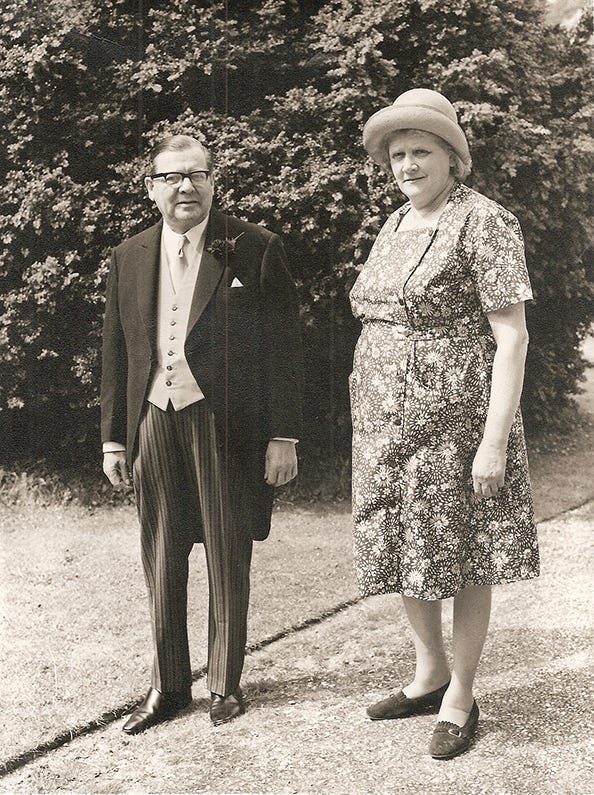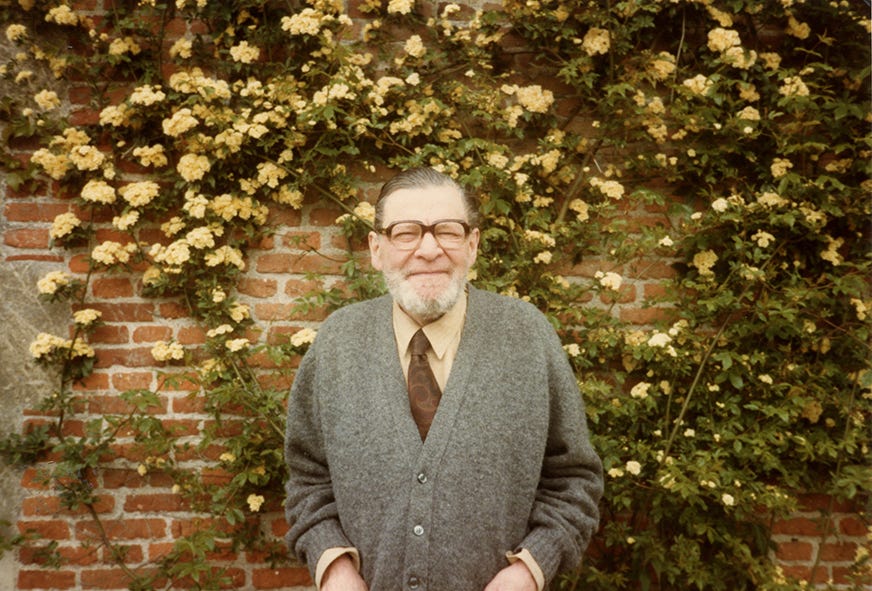Edward Knight III: My Grandfather and the 15th Squire of Chawton House
Carrying the weight of 400 years: A young man's impossible inheritance
Hi everyone,
The last ten days have been a whirlwind travelling from Australia to the UK via a major Jane Austen event in the Netherlands, and straight into Jane Austen Regency Week at my childhood home of Chawton and the neighbouring town of Alton.
I'll share these events with you over the coming days, but first I wanted to talk about my grandfather, Edward Knight III, great-great-grandson of Edward Austen Knight.
Edward Knight III, or Bapops as he was known to us, was the 15th Squire of Chawton. By the time he died in 1987, Chawton House was in desperate need of repair and the family fortune was gone forever. As a child, I had conflicted feelings about his role in ending four centuries of family history at Chawton. When we left, we had no idea what would happen to the house. We didn't know it would become a world-renowned centre for literary heritage, where we could continue to play an active role alongside the public. My parents have volunteered at the house for decades, my mother caring for the Knight Family Collection of books, restoring and cataloguing them, while my father serves as both guide and handyman, making countless repairs. I love visiting the house and have had the privilege of speaking to a packed crowd in the Great Hall. I am proud to promote Chawton House through my work around the world.
We also didn't know that my family would retain ownership of the house. It hasn't been sold; it operates under a long-term lease to the charity that runs it today. Even more remarkably, my own niece and great-niece (the 6th and 7th great-nieces of Jane Austen) now live in a cottage on the grounds. Nothing fills my heart with more joy than seeing the next generation of Austen descendants growing up in Chawton. The legacy continues.
The Knight family presence in Chawton is far from over and, fingers crossed, will survive for centuries to come. With this comfort, and perhaps the wisdom that comes with being in my fifties, I've developed a different perspective on my grandfather, a man who carried the weight of 400 years of family history on shoulders far too young to bear it.
Born in 1910, Bapops inherited Chawton House at just 22 when his father Lionel Knight died unexpectedly. On the face of it, inheriting Chawton made him a wealthy man, a fortunate man. But the cruel twist of fate was that Lionel hadn't finished paying the death duties for his predecessor, Montagu Knight. Bapops found himself responsible for settling not one, but two sets of crushing death duties.
The financial devastation was merciless. Land, buildings, and treasures accumulated over centuries were sold piece by piece to satisfy these obligations. Without rental income from lost assets and with the family fortune depleted, there was nothing left to maintain Chawton House itself. The sales continued relentlessly through the 1930s, 1940s, and beyond. Our days at Chawton House were numbered from the moment he inherited.
Despite these overwhelming challenges, Bapops had lived a remarkable life before the weight of responsibility crushed his spirit.
He owned polo ponies, kept on livery at Hall Farm in Bentworth (a nearby village), and played for the polo club in Kenya from 1932-34, where he also served as an A.D.C. (aide-de-camp), a prestigious military appointment as personal assistant to a high-ranking colonial official. He also owned a racehorse called Blyth Boy and was a member of the Hampshire Hunt. He kept a pack of beagles for hare coursing in the kennels at Chawton House and looked after pairs of hound puppies sent to homes to be socialised as part of their preparation to join the fox hunting pack. My father remembers a silver spoon engraved with "Light Foot", a gift from the Hampshire Hunt bearing the name of one of these puppies.
Beyond his love of horses and country pursuits, Bapops was a keen and talented cricketer. He made history as the only first-year boy at Sherborne School to play for its first eleven, was a life vice-president of Chawton Cricket Club, and played cricket for Alton. He also owned a yacht, moored in the Hamble on the south coast.
Bapops had a passion for photography and took friends on photographic safaris to Kenya. Some of his beautiful black and white photographs hung in the Servants' Hall when I was a child, capturing a world of adventure that seemed impossibly distant from the declining estate he'd inherited.
He served his country in the territorial army before joining the Queen Victoria Rifles, serving in the Second World War in France, before being seconded to the 17th-5th Jat Regiment in India.
I remember one photograph of him as a dapper young man in an open-topped car. To my young eyes, with little frame of reference, he looked like Bugsy Malone - glamorous and carefree in a way I could never reconcile with the reclusive figure he'd become.
There was no doubt that he continued to live the life he was accustomed to, despite the financial challenges of the estate he had inherited. But with continued sales of assets, land, and buildings, it all caught up with him eventually.
The final blow came in the 1950s with the last major sale of assets. Among the items sold was Edward Austen Knight's own portrait, a heartbreaking demonstration of just how desperate things had become. Selling the portrait of the very ancestor who had built the family's fortune must have felt like the ultimate betrayal of his custodial duty.
By the time I was born in 1970, Bapops had become a recluse who almost never left the house. In my entire lifetime, he ventured out of the Chawton estate only once that I know of, when we all went to Hackwood Park to watch my cousin Georgina race in the point-to-point Hampshire Hunt steeplechase. I've been told he never recovered from the devastation of that final sale in the 1950s, retreating into an isolation from the outside world that would define the rest of his life.
There were a small handful of family members he spoke to, along with his longstanding accountant and lawyer who visited him at the house, but he never spoke to me. The only conversation I ever had with my grandfather was on his deathbed. It was very cathartic for me to share this conversation in my memoir Jane & Me: My Austen Heritage.
Perhaps Bapops wasn't the ideal custodian of our family heritage. Despite the impossible circumstances, he could have managed things differently. But when I think of a 22-year-old inheriting such crushing responsibility and financial ruin, it's hardly surprising that he broke under the pressure.
Bapops died on 8th October 1987, just days after our one and only conversation. I was 17 years old. The night before his funeral, England was battered by the worst storm since 1704 when Elizabeth Martin Knight was mistress of Chawton House. Fifteen million trees fell across the South of England that night, and our estate was littered with fallen giants.
With our family motto Suivant Saint Pierre (follow St Peter), we joked that Bapops must be causing quite a stir at the pearly gates. As devastating as the storm was, it felt somehow fitting, his funeral marked such a seismic moment in our family's history that even nature seemed to acknowledge it.
We gathered in the Great Hall that morning before walking down to the church, which was already packed with people who'd come to pay their respects. Most hadn't seen him in decades, if ever, but he was the 15th Squire of Chawton House, and his passing marked the end of an era.
All eyes followed us as we walked up the central aisle to the Knight family pews. Granny sat with her head bowed while I fought back tears, knowing this was about more than losing our grandfather.
His death meant change for everyone. After 400 years, the Knight family could no longer afford to keep Chawton House. The estate and its impossible challenges passed to my father's older brother, Richard. I couldn't imagine living anywhere else and felt numb at the prospect of what lay ahead.
But as you know, Richard achieved what seemed impossible, finding a way for Chawton House to be restored and opened to the public. This transformation has allowed our family to maintain our connection to Chawton while sharing this remarkable place with visitors from around the world. What was once our private family home is now a beacon of literary heritage.
Today, Edward Austen Knight's portrait hangs once again in the Dining Room at Chawton House, the very room that served as my sitting room when we lived there. But sadly, my grandfather never had his portrait painted or commissioned a bookplate with his coat of arms. Perhaps he felt unworthy of continuing these family traditions, given the circumstances that defined his stewardship.
That's why I'm on a mission to commission a portrait of him. Despite his failings and the tragic end to our family's residency, I believe Edward Knight III deserves to hang alongside his predecessors on the walls of Chawton House. He may not have been the custodian the estate needed, but he was still our 15th Squire, a young man who shouldered an impossible burden that ultimately broke him.
His story deserves to be remembered as part of Chawton House's long history, a reminder that behind every grand estate are real people facing very human struggles.
Caroline
Coming up: exclusive stories from Jane Austen Regency Week, my adventures at a wonderful Jane Austen celebration in the Netherlands, and my candid reflections on the new Jane Austen sculpture Dad and I unveiled with the mayor of Alton. Subscribe today to get the full behind-the-scenes story of this special weekend.








Thank you for sharing about your grandfather.